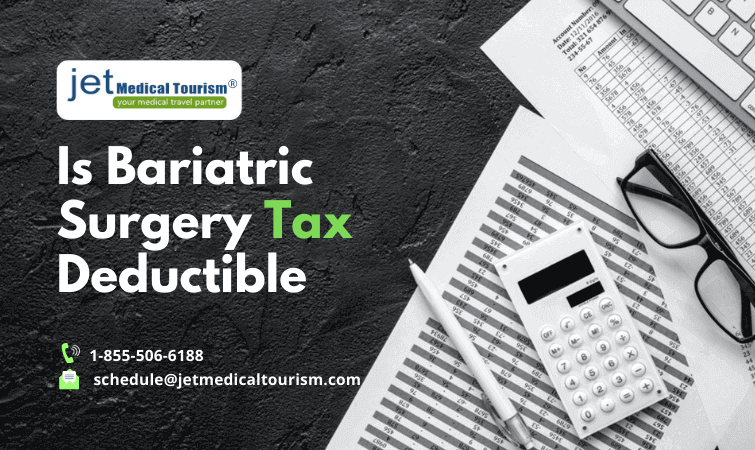Is Bariatric Surgery Tax Deductible

Millions of Americans struggling with obesity should know that bariatric surgery is tax deductible in the US, subject to certain conditions. In 2002, the Internal Revenue Service (IRS) changed its tax laws to recognize obesity as a medically accepted illness. For taxpayers, the implication of this ruling is that patients can claim their expenses related to weight loss surgery as a medical deduction.
Contact Jet Medical Tourism® today .
Are elective medical procedures tax deductible?
No, elective medical procedures are not tax deductible in the US which is too bad since inflation, taxes, and higher energy prices are all hurting Americans now. However, weight loss surgery is tax deductible when the procedure is performed as a non-elective medical necessity. At your initial consultation with a bariatric surgeon, it is possible to determine whether you qualify as a candidate for a weight loss surgery for medical reasons. Once your candidacy is confirmed, you can claim bariatric surgery as tax deductible item in your tax return.
Can I claim surgery on my taxes?
The IRS rules make it clear that all expenses that are directly related to the treatment of your problem of obesity can be itemized for tax deduction, subject to conditions. This includes all types of bariatric surgery procedures, such as gastric sleeve and gastric bypass. Other related medical costs, such as consultations with the doctor, surgeon, nutritionist, and physical or behavioral therapist, and medical tests are also tax deductible.
Can I claim deduction on elective procedures?
Elective medical procedures are not tax deductible because they are performed to satisfy your aesthetic needs or promote general well-being, but not to protect your health. As a result, the costs of liposuction, joining a gym or health club, buying home fitness equipment, or using diet foods are not tax deductible. These are considered personal expenses (as per IRS rules), which may be good for health, but are not medically necessary.
READ THIS: Weight loss surgery payment plans
Weight loss surgery tax deductible
Are you wondering is bariatric surgery tax deductible? The answer is yes! The amount of your weight loss surgery and treatment costs that is not compensated by insurance can be claimed as a medical deduction in your tax returns, subject to specific limitations.
- Letter from surgeon: To ensure that your weight loss surgery is tax deductible, you must obtain a letter from your bariatric surgeon confirming that your procedure is a medical necessity. Based on your body mass index, co-morbidities and other factors, your surgeon will provide you this letter. This will serve as a proof of your legitimate claim for tax deduction.
- Percentage of income: According to the IRS rules, to make weight loss surgery tax deductible, the uncompensated cost of your bariatric procedure should more than 7.5% of your adjusted gross income (AGI). For instance, if your income is $60,000, your bariatric surgery expenses should be in excess of $4,500 (7.5% of $60,000) to qualify for tax deduction.
- Other medical expenses: The tax code allows you to combine all your medical expenses during the year to meet the minimum threshold of 7.5% of your adjusted gross income. This means, if you incurred some dental, eye care, or other healthcare expenses during the year, these can be added to your cost of bariatric surgery to meet the 7.5% threshold.
- Cost of bariatric diet: While bariatric surgery is tax deductible, the ongoing expenses on your post-operative bariatric diet cannot be claimed for tax deduction. Even if the bariatric diet is considered critical to your weight loss success, the tax code does not allow it as a deductible because even without the surgery, you would be consuming food anyway.
READ THIS: Gastric sleeve diet: An ultimate guide on VSG diet
Is gastric sleeve surgery tax deductible?
Yes, gastric sleeve is tax deductible, provided you fulfill the criteria defined under the US tax code. The IRS officially recognized obesity treatments as a tax deductible expense in 2002. Sleeve gastrectomy (VSG) was already a medically accepted procedure for obesity by that time. Therefore, ever since the IRS changed its policy to accept obesity as a disease, gastric sleeve surgery tax deductible rule has been in force.
For patients who want to know, “Can I claim surgery on my taxes,” the good news is that your entire gastric sleeve surgery expenses, including consultation charges, diagnostic tests, surgeon’s fee, anesthesia costs, hospital charges, and prescription medications can qualify as a tax deductible item on Schedule A. Any expense that has been reimbursed from insurance cannot be a part of your gastric sleeve tax deductible claim.
READ THIS: How much does gastric sleeve cost?
Is gastric bypass surgery tax deductible?
Yes, gastric bypass surgery is tax deductible, subject to certain IRS provisions. Gastric bypass is the oldest form of bariatric surgery, and is widely accepted as the gold standard procedure for weight loss. Bariatric surgeons particularly recommend gastric bypass for patients who are suffering from obesity-related type 2 diabetes or other co-morbidities. Since 2002, the IRS has recognized gastric bypass as an obesity treatment.
Gastric bypass surgery can result in nutritional deficiencies because it is a malabsorptive procedure. Therefore, if your surgeon gives in writing that you require nutrition supplements as a long-term medical necessity post-surgery you may continue to claim deduction on this expense every year. It’s always an astute idea to talk to a tax advisor to ensure that you are fulfilling all the IRS pre-requisites to make gastric bypass surgery tax deductible.
DISCLAIMER: Some or all of the hyperlinks embedded in this web page may link back to Mexico-specific surgery procedures. Those links are only meant for general information purposes, and may not have any relevance to the content of the given web page. Readers should exercise discretion and consult a medical professional before making any decisions related to a choice of procedure or a choice of location for treatment.


